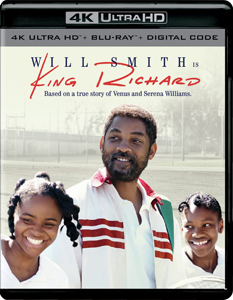When “King Richard” (2021) was announced, I thought the story of the rise of Venus and Serena Williams – under the tutelage of their grandstanding father — was too well-known to make an intriguing movie. I mean, even going without a Grand Slam title since 2017, Serena is still the most famous female athlete on the planet. Perhaps, I thought, the film would be aimed at non-tennis fans and be boring for those in the know.
Deft screenplay
But screenwriter Zach Baylin and director Reinaldo Marcus Green thread the needle (or should I say “string the racket”?) to craft a crowd-pleaser that showcases Richard Williams (Will Smith) in all his contradictory, head-scratching glory. Granted, it wasn’t going to be too controversial; Venus and Serena’s half-sister Isha Price was an on-set consultant, after all.
Still, Baylin’s screenplay is smart to focus on Richard, whose behavior leads to baffled reactions from friends and skeptics alike. Smith’s initially caricature-ish portrayal of a smart man with inarticulate speech patterns ultimately becomes a lovable portrayal, and it had me chuckling.
“King Richard” (2021)
Director: Reinaldo Marcus Green
Writer: Zach Baylin
Stars: Will Smith, Aunjanue Ellis, Saniyya Sidney
Also wisely, Baylin tells the story only through Venus’ pro debut in 1994 at the Oakland tournament. He dodges the darker events of the 21st century – such as the gang murder of half-sister Tunde Price (Mikayla Lashae Bartholomew in the film) and the split of Richard and wife Oracene (Aunjanue Ellis in the film) – but he hints at them.
One of the scary aspects of training future tennis champions in Compton is the gang presence, even around a tennis court in the daytime. Richard teaches himself the game via magazines and instructional videos, trains his girls at the public courts, and has to deal with gangbangers hitting on oldest daughter Tunde.
He does all this while working a security job that – combined with his wife’s nurse gig – allows for a home only big enough to provide one bedroom for all five girls.
Loving portrayal of love
“King Richard” is perhaps too kind to the titular man who has fathered so many children that no official count is available. However, it does show the rift between Richard and Oracene (also called Brandy), particularly in a powerful kitchen confrontation. By this point, things are going well business-wise, as the family has moved to Florida for Venus’ and Serena’s training at the academy of Rick Macci (“Punisher’s” Jon Bernthal, great as always).
Richard’s love of the five girls under his roof is genuine thanks to the cast’s chemistry. The film suggests this admirable trait of Richard’s is why Oracene sticks around. “King Richard” often suggests things rather than overstating them like a lesser biopic might do.
I wonder if the movie’s Venus (Saniyya Sidney) and Serena (dead ringer Demi Singleton) are more joyous than their real-world counterparts. The sisters often seem quiet, morose or (in some cases with Serena) fiery on live TV.
But maybe we’re getting a peek into their off-camera lives as happy teen girls. For all Richard’s promotion of himself and his daughters, we also see him dismiss a reporter after two questions following Venus’ WTA Tour debut at age 14. To this day, the Williams sisters maintain an odd balance of being world famous and keeping their private lives private.
Respectable tennis action
“King Richard” isn’t a sports film you’d watch for the sports. But what we do get is solid and well-edited. The stunt doubles for the sisters are excellent. Venus’ trademark way of cocking her racket before a backhand stands out.
Richard was all about planning for his daughters’ stardom, yet he initially holds Venus and Serena back; it’s the core contradiction among his bevy of strange behavior. Appropriately, “King Richard’s” theme is not straightforward.
The film contends that success comes from planning (“If you fail to plan, you plan to fail,” says Richard’s homemade sign), yet it acknowledges luck. In a striking sequence, Richard makes a decision that will ruin his life and that of his family, but he’s bailed out by an incredible coincidence.
Also, Venus and Serena happened to love the thing Richard hoped they would love. No, he wasn’t a monstrous tennis parent – he expresses his belief that those people “should be shot” – but he doesn’t have to be. He isn’t challenged with a situation where his girls hate tennis.
Race to the finish
Still, I suppose Richard faced enough hurdles, including the elephant in the room that I haven’t mentioned yet: There weren’t many black tennis players at all – to say nothing of elite ones – when Venus and Serena were growing up.
“King Richard” explores this issue but doesn’t hit us over the head. It even has some fun with race, like when the family is running late for a junior tournament (during the brief time when he let Venus play juniors) and Richard says “We can’t be the only black people here and be late.”
I admire Baylin’s measured perspective. He knows the Williamses’ situation in the 1980s and ’90s, while hard, doesn’t compare to those of Arthur Ashe and Althea Gibson. Because of deft touches like this from start to finish, Best Original Screenplay is the Oscar “King Richard” most deserves to win.


